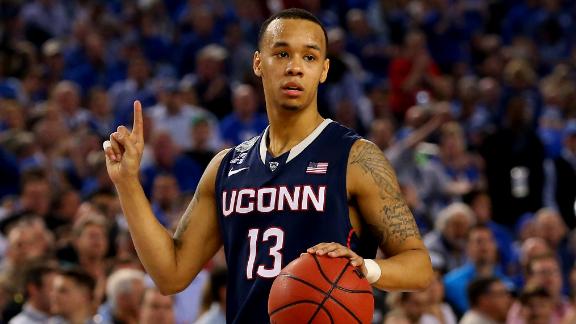
Once again, the NCAA men’s basketball champion will come from the ACC as the Duke Blue Devils defeated the Wisconsin Badgers 68-63 on Monday night. Tyus Jones was outstanding, and it should not be lost on basketball fans that Frank Kaminsky’s double-double in a losing effort was also spectacular. The senior Kaminsky shut down the much more heralded Jahlil Okafor for most of the night, but end the end it was Duke’s Jones who made the difference for Coach Mike Kryzewski, who landed his fifth national championship. Duke’s Greyson Allen also had a phenomenal effort to help pull Duke back into the game in the second half.
Tyus Jones, Greyson Allen and Frank Kaminsky were the standouts, but solid games were turned in from Bronson Koenig, Nigel Hayes, Quinn Cook and Justice Winslow.
Wisconsin’s Sam Dekkar, who has been an impact player throughout this year’s tournament, had a disappointing night, going 0-6 from beyond the three point line. Dekkar was able to get some points around the rim but overall was much less of a factor in the title game. Wisconsin guard Traevon Jackson was able to put pressure on the Duke defense with the dribble but had a poor shooting night, going 1-for-7 from the field and making a couple of costly decisions near midcourt.
Overall, Wisconsin controlled much of the game but had trouble keeping Greyson Allen and Tyus Jones from scoring in the second half. Kaminsky used his length to beat Okafor repeatedly on the inside for Wisconsin but once Duke was able to take a late lead, Wisconsin’s methodical offense worked against them and Duke was able to hold on for the win. Kaminsky will need to get stronger for the NBA but I expect him to have a lengthy career at the pro level. Okafor continues to show flashes of brilliance with great footwork around the basket and a soft touch.
The issue for Okafor for me is that even in AAU and high school, I’ve yet to see him dominate – or even have a decent showing against – another quality big man. This season he struggled in both games against Frank Kaminsky as well against the multiple bigs of North Carolina. This has to be taken into account, because the reverse is that Kaminsky played extremely well both times he faced Okafor and Kaminsky played extremely well against Karl Towns and Willie Cauley-Stein of Kentucky. The hope is that the difference between Kaminsky’s solid consistent showings and OKafor’s consistent disappearances is just experience, as ‘Frank the Tank’ is a senior and Okafor just a freshman. But Kaminsky’s play still should be noted, just as it should be noted that despite Tyus Jones’ size, he has now shown he can execute against the best college teams in the nation.
Jones and Kaminsky are not getting a ton of love from NBA scouts, while Okafor is. Some of this is because of the physical nature of the NBA and the style of play; Kaminsky will have to change the way he plays defense at the next level and it will require much more mobility than he had to use at Wisconsin. For Tyus Jones, physical strength at the guard position is a must-have. Jones was known in high school for being able to take a body blow on the drive, but still square up and finish. If he was to stay in college another couple of years, he would likely add the strength to show this at the college level as well. Would he be able to withstand the physical thumping he would take from the grown men in the NBA? That, effectively, is the million dollar question. While Okafor and even Justice Winslow are already strong enough to move to the NBA game, Jones and Kaminsky have some work to do.
Okafor carves up smaller post players with ease and had fantastic hands, but at some point he will have to show he can do it when faced with another player his size. The prevalent wisdom from NBA scouts and GMs is that he will get there in a few years, so he still should be considered the top prospect in this year’s NBA draft. It’s hard to argue with his agility and as a true center he is much lighter on his feet than most players at the position I’ve seen.







